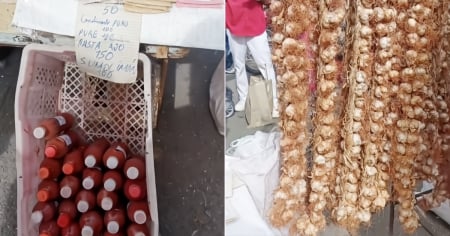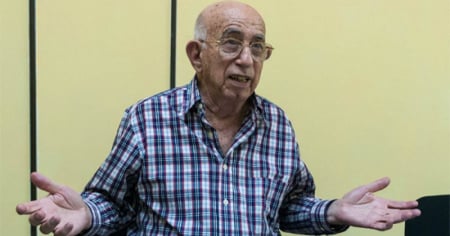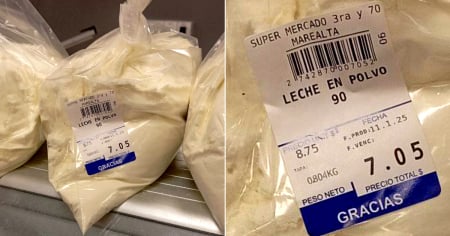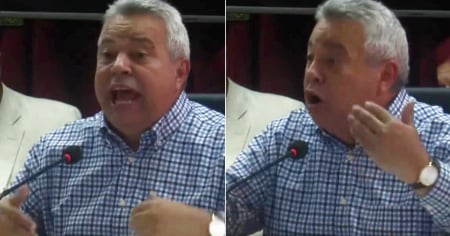The Cuban Vice President Salvador Valdés Mesa acknowledged that food prices are so high that it is impossible to live on a salary of 6,000 pesos.
On a visit to the Agroindustrial Grain Company of Los Palacios, in Pinar del Río, the leader addressed the crisis affecting the population, particularly the low purchasing power of salaries and pensions in the face of the high cost of living.
"Our retirees have average pensions of 1,525 pesos. You can't live on that; with an average salary of 5,000 pesos, you can't live, nor with 6,000 pesos... You can't live given today's prices," he admitted.
Valdés Mesa, however, remained in a state of "concern," without offering solutions or, let alone, acknowledging the government's responsibility in the country's economic collapse.
The minimum wage in Cuba has been around 2,100 pesos since January 2021, when the failed "Tarea Ordenamiento" adopted by Miguel Díaz-Canel came into effect.
Carrying out a monetary change in an unproductive economic context that depends on imports for the supply of basic goods caused inflation to soar and prices to rise uncontrollably, while wages have barely seen any significant increases.
Hundreds of thousands of workers earning salaries in the depreciated Cuban peso are desperately realizing that they cannot afford the high costs of food and other essential goods, and they feel the helplessness of becoming poorer every day.
There are countless complaints on social media from Cubans, many of whom have a high professional level, whose meager salaries do not allow them to access the most basic necessities.
In November last year, a doctor from Sancti Spíritus expressed her outrage at the impossibility of purchasing a can of milk powder for her daughter, the price of which on the black market is equivalent to two months of her salary while she is on maternity leave.
"I, a Cuban doctor with a basic salary of 5,000 Cuban pesos, and currently receiving 3,400 pesos while on maternity leave, need two months of work to buy my daughter a can of milk on the black market. A can that doesn't even last a month if she drinks two 8-ounce glasses a day," denounced Danielly Aróstica.
Months ago, an engineer, a mother of two and an entrepreneurial woman, shared a video to explain what can be bought with the minimum salary, and showcased the groceries she bought at the farmers' market along with their prices.
"I'm showing you what we can buy here in Cuba with just a bit more than a minimum wage. Of course, I'm talking about food, because when it comes to clothing or shoes, it's almost impossible," she wrote.
The young woman showed her purchase: a string of 10 onions, five plantains, a string of about twenty heads of garlic, and four pounds of green tomatoes. All for a total of 2,930 Cuban pesos. "Do you think that's expensive or cheap? In my opinion, it's extremely expensive..." she noted.
Even state-affiliated journalists have echoed the discontent felt by the vast majority of the population, who see that their salaries and pensions are insufficient to meet their most basic needs for food, transportation, or hygiene.
The journalist Jesús Álvarez López, a reporter for the Villa Clara network CMHW with 40 years of service, expressed his outrage over the constant price increases of products in Cuba, especially those coming from the countryside.
What can a retiree with 1,528 pesos buy today, if even yuca, boniato, pumpkin, and flour have been stripped of their historical simplicity?" he questioned.
The economist Pedro Monreal is convinced that the "economic 'ordering'" designed by the government resulted in a brutal compression of workers' wages, leading to widespread impoverishment.
Monreal has criticized the Ministry of Economy and Planning for attributing the decline in the purchasing power of wages and pensions solely to external factors such as the economic "blockade" and the Covid-19 pandemic.
According to the expert, the relative decrease in wages and social security contributions reflects poor decisions that have not been corrected, leading to a disparity between income and rising consumer prices.
Frequently Asked Questions about the Economic and Food Crisis in Cuba
Why is it impossible to live on a salary of 6,000 pesos in Cuba?
The Cuban Vice President Salvador Valdés Mesa admitted that a salary of 6,000 pesos is not enough to live in Cuba due to the high cost of food and basic products. Uncontrolled inflation and the low purchasing power of salaries have caused prices to skyrocket, leaving many Cubans in an unsustainable economic situation.
What is the current situation of retirees in Cuba?
More than 39% of Cuban retirees survive on minimum pensions of 1,528 pesos per month, which is equivalent to less than 5 dollars at the informal exchange rate. This amount is insufficient to cover basic needs, forcing many elderly individuals to seek additional income by scavenging or collecting raw materials.
How has inflation impacted food prices in Cuba?
The inflation in Cuba has led to a significant increase in food prices, making basic products such as rice, pork, and beans inaccessible for most families. The dollarization of essential sectors and the inability to control shortages have exacerbated the country's economic situation.
Why has the Cuban government been unable to improve agricultural production?
Despite calls to increase agricultural production, the Cuban government faces significant obstacles such as a lack of resources, insufficient investment, and dependence on imports. The agricultural sector has experienced a 59.1% reduction in rice production in 2023, reflecting the ineffectiveness of the policies implemented to reverse the food crisis.
Filed under:





